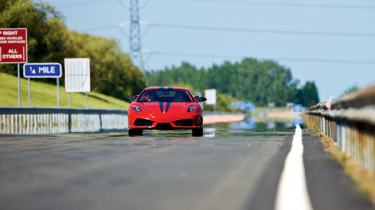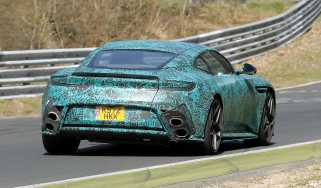Ferrari 430 Scuderia
Ferrari says the 430 Scuderia is as quick as an Enzo. We put it through a full performance test to find out if it’s true
It’s said that Enzo Ferrari built road cars simply to fund his passion for racing, and it seems that something of that spirit lives on at Maranello today in the way that the company has no qualms about using its supercar back-catalogue to reference the performance of its latest road cars. The 599 GTB Fiorano took as its benchmark the iconic F40, and gave it a drubbing. Now the Enzo, Ferrari’s most potent and fastest road car of all time, finds itself used to illustrate the pace of the 430 Scuderia.
The Scuderia is unquestionably the feistiest mid-engined V8 road car that Ferrari has built, but even with 503bhp – 20bhp more than the stock F430 – it’s way down on the Enzo’s 650bhp. Yet while it can’t hope to attain the Enzo’s top speed, Ferrari says the Scuderia can match its 0-60mph time and, far more significantly, replicate its lap time around the company race track, Fiorano.
It sounds extraordinary when you consider that the Enzo predates the Scuderia by barely five years and back then represented Ferrari’s take on the ultimate supercar. Yet while the Enzo has a carbonfibre tub and panels, the all-aluminium Scuderia is 15kg lighter. At a claimed 1350kg it weighs 85kg less than the regular F430 thanks to a wide-ranging weight reduction programme that includes hollow anti-roll bars and titanium road springs, lightweight bumpers, a Lexan rear screen and, inside, reduced sound-deadening and extensive use of carbonfibre, notably for the door casings and seat shells.
Then there are standard-fit carbon-ceramic brakes and sticky Pirelli P Zero Corsa tyres, both of which offer the benefits of five years’ extra development over the Enzo’s carbon brakes and bespoke Bridgestones. All these details add up, but if you’re looking for the technology that helps the Scuderia nail the same lap time as the Enzo despite a 150bhp shortfall, it’s the chassis. Specifically, it’s the combined effect of the Scuderia’s E-diff, its electronically controlled locking differential, and F1-Trac, the advanced stability control developed originally for the 599 GTB. Working together, they maximise the drive the 430 Scuderia finds out of corners and enhance stability going into them, too. Michael Schumacher is said to have been instrumental in the development of this system.
What we want to know is, will the Scuderia deliver on the West Circuit at the Bedford Autodrome as convincingly as it does at Fiorano? We’ll soon see. Normally we’d get the performance figures in the bag before pounding around the track, but today circumstances compel us to do the laps first and Millbrook Proving Ground second. This will be followed the next day by an early morning call at the Thorney Motorsport rolling road in Milton Keynes.
It’s as I’m signing-in at the Autodrome that I get a call from the Ferrari GB press manager telling me that he’s in the canteen and that he has a surprise. When we test any other car, it is delivered to the office and gets collected a few days later. Not a Ferrari. Their cars come from the factory with a support crew, which today includes an engineer, a technician and a test driver to check that the car is as it should be and offer advice on how to get the best out of it. The surprise is that today the test driver is a bloke called Marc Gene. Yup, Ferrari’s F1 test driver will do a couple of laps of the West Circuit before handing over to me. No pressure, then. Thank goodness Schuey was busy…
As usual, Ferrari has a target, in this instance the big-hitting Porsches that have already been around the recently revised West Circuit: the 523bhp 997 GT2 and the 604bhp Carrera GT, which recorded 1:23.5 and 1:23.3 respectively. The Enzo lapped the old circuit, which was a bit quicker, in 1:21.3sec, so if the Scuderia gets close to that, it’ll be on the money.
Gene reckons the fastest times will come with the steering wheel manettino set in the ‘Race’ position, which slackens the traction and stability systems but still allows them to optimise corner speed. A couple of laps alongside the hugely likeable and, of course, effortlessly rapid Gene reveal a few things: first that the Scuderia can carry huge speed to the apex under braking, second that there’s a bit of understeer in the quick turns, and third that he can’t stop himself cutting across the odd kerb.
Back in the pits, Gene delivers his verdict. ‘In Race it was definitely helping out of the hairpin and other slow corners,’ he says, ‘but it was perhaps a little conservative in the very fast turns. Try it in the next setting up, CT-off, for a couple of laps too.’ CT-off is a new setting introduced for the Scuderia. It retains stability control but disables traction control, thus allowing wheelspin.
There’s a lightness, an athleticism about the Scuderia that you notice right from the off. The steering has good weight but relays clearly that the nose is light, and you quickly appreciate that the key to a fast lap is keeping things tidy. It’s as if you have to guide it along a narrow path, not allowing either understeer or oversteer to get beyond a quarter turn. Imagine a bigger, more potent, more feelsome Lotus Exige and you’re not far off. Even with traction control assisting in Race mode, it pays to feather the throttle out of the Bank hairpin so as not to get the tail out and excite stability control into throttle-cutting action. Perhaps unusually for a 500bhp car, the Scuderia is more awesome into the corners than out of them, the highlight of the lap being the entry to the new Pif-Paf sequence. You brake with confidence from over 110mph and peel in still hard on the brakes, anti-lock resisting triggering, the grip of the Pirellis divided between braking and cornering, while the E-diff and stability control ensure rock-solid composure.
This corner also shows the superb ‘F1-SuperFast2’ paddle-shift off to best effect. Not only can you be lunging deep into turns hard on the brakes but you can pop in a downshift too, the gearbox shifting so smoothly that there’s not even a suggestion of the balance being compromised.
The fastest laps are with Race mode selected, though there’s just a couple of tenths in it – 1:22.5 with versus 1:22.7 without. It feels like it would go a bit faster with less understeer, and reducing the front tyre pressures to match the rears (we normally stick with the manufacturer’s recommendations) does the trick. It feels like the rear is taking more of the cornering load, which makes things a bit serious in CT-off in the faster turns (and no quicker overall), but in Race mode the Scuderia seems to balance right on the edge. It’s there in the lap time, too – 1:21.7, which takes its advantage over the Porsches out from around 1sec to over 1.5sec. Allowing for the changes to the circuit, that also puts it on a par with the Enzo we tested on the old layout, and there’s no question that the Enzo, with simple traction control and a purely mechanical limited-slip diff, was looser and much scarier.
A COUPLE OF HOURS later, we’re lined up on the mile straight at Millbrook. First it’s the in-gear acceleration tests. From a little over tickover, this 4.3-litre, flat-plane-crank V8 feels and sounds like one of the sweetest and fruitiest twin-cam in-line fours you’ve ever heard. There’s a sense, especially in the higher gears, that it’s not 100 per cent happy paddling in the shallows of its rev range, but that might be because of the way it snaps to attention at 3250rpm. In an instant the delivery changes as valving inside the exhaust system directs exiting gases onto a more free-flowing route. It’s as if corks plugging the Scuderia’s tailpipes have been yanked out – the V8’s note hardens to a raw blare and the car kicks forward with serious intent.
At around 7000rpm there’s another uplift that marks a wailing and even more urgent push to peak power at 8500rpm. By this point, less than 200rpm short of the limiter, all five lights embedded in the steering wheel rim are aglow. Ignore them in Race mode and the V8 will stutter against the limiter at 8640rpm precisely. It’s a limiter that, incidentally, is more saw-toothed in its action in the first three gears.
As well as delivering 20bhp more than in the F430, the Scuderia’s V8 pumps up the torque curve too, and certainly the delivery is more consistent than you’d imagine from the way the engine note changes. Third gear offers serious punch from 20mph to a whisker over 100mph and, once it’s into its stride, the kick in the back never lets up: 40-60mph takes a mere 2.1sec and 80-100mph 2.3sec.
As with the 599 we tested in issue 101, to execute a standing start with the aim of nailing the best time rather than the most drama, you won’t be needing the launch control button (the one marked LC) on the centre console. Marc Gene leans in and talks us through it. Twist the manettino fully clockwise to switch off everything apart from anti-lock, press the brake and select first with the right-hand paddle, then pull and hold the left-hand paddle for about three seconds. There will follow a long beep and the digital gear indicator will blink ‘L’ and ‘1’ alternately to let you know that the Scuderia is primed for launch. All you have to do now is snap the throttle open.
The first start feels almost perfect. I hit the throttle, the revs rise rapidly to around 6000rpm and after a moment the Scuderia brings the clutch in and takes off. It feels like there’s no slip at all, yet the revs don’t die, indeed they stay almost constant and the Ferrari snaps forward, driving us into our seats with a delicious force and keeping us there. You get a ‘free’ limiter-brushing automatic upshift from first to second gear, but from there on it’s up to you – using your skill and judgement, Spot-the-Ball style, you use the shift lights and rev-counter to judge when to request the upshifts.
There’s a lovely, soft ba-boom on each gear-change but essentially the acceleration feels like a single uninterrupted lunge from zero to over 160mph. There was the feeling at the Autodrome that slivers of time were being saved on upshifts, and analysis of the standing-start acceleration trace shows this to be the case. The 599 (shift speed 100ms) felt very good, but its trace clearly showed the first three upshifts as steps. In contrast, that of the lighter Scuderia (60ms) shows a small step from first to second gear but thereafter the curve is virtually smooth.
Normally we’d alternate runs in either direction, but the real launch control of the Scuderia needs to ‘learn’ the surface for the first couple of runs and delivers the best times on run four or five. Catchpole and I are impressed with the clean lunges the Scuderia makes – there’s not a whiff of burnt clutch as the E-diff and electronic management of the clutch conspire to deliver the best take-off.
Now, I consider 3.9sec to 60mph and 100mph in the low eights to be pretty sensational. However, the Scuderia is not delivering what Ferrari claims. I can’t see it bettering 3.9sec by four tenths, but that’s what the engineer says it should be doing. Suspicion falls on the tyres, which still look roughed from the Autodrome, so they are replaced with another set that are 10 per cent worn. We line up again and, to the surprise of Catchpole and myself, less than half a dozen runs later we’ve bagged an Enzo-matching 3.5sec to 60 in each direction and an average of 7.7sec to 100mph. Not much else we’ve tested has gone quicker.
The Scuderia’s performance versus that of the 599 we tested makes interesting reading. Fully fuelled, this Scuderia weighs 1374kg (against a claimed 1350kg), giving a power-to-weight ratio of 372bhp/ton. The 599 we tested weighed-in at 1733kg, giving 364bhp/ton. Despite this, the front-engined V12 berlinetta just has the edge over the mid-engined V8, getting to 100mph three tenths of a second faster and then growing the advantage to almost 2sec by 160mph. And although the 599 is 359kg heavier, it has a superior torque-to-weight ratio, which shows in the in-gear times, especially in the higher gears: 50-70mph in fifth and sixth takes 3.9 and 5.8sec in the 599 compared with 4.4 and 6.8sec in the Scuderia.
IT WOULD HAVE BEEN good to confirm the Scuderia’s power, but despite the best efforts of the crew at Thorney Motorsport, two hours on the rollers and half a tank of Shell V-Power, the Ferrari refused to play ball. Some cars get unhappy when their rear wheels are doing 140mph and the fronts are static, and the Scuderia refused to rev out. However, Ferrari had dyno-tested the engine in this car and the output we saw on the rollers at 7000rpm matched almost exactly what had been seen on the dyno on the way to 501bhp.
There’s nothing about the way the 430 Scuderia has performed to suggest it has anything less than 500bhp; it nailed an excellent time around the West Circuit and bagged a very impressive set of figures at Millbrook. Indeed, the closer you get to the Scuderia, the harder you push it, the more impressive it is. It showcases Ferrari’s Formula 1-derived technology – particularly its F1-SuperFast2 automated manual gearbox and E-diff and F1-Trac stability control – better than any other Ferrari we’ve tried. And even a sceptic of such technology transfer would have to concede that the Scuderia’s abilities are exceptional and uniquely inspired. All-time great status is surely a certainty.
Extra Info
Engine: V8Location: Mid, longitudinalDisplacement: 4308ccBore x stroke: 92 x 81mmCylinder block: Aluminium alloy, dry sumpedCylinder head: Aluminium alloy, dohc per bank, 4v per cylinder, variable valve timingFuel and ignition: Electronic engine management, sequential multipoint injectionMax power: 503bhp @ 8500rpmMax torque: 347lb ft @ 5250rpmTransmission: Six-speed ‘F1-SuperFast2’ automated manual gearbox, rear-wheel drive, E-diff, F1-TracFront suspension: Double wishbones, coil springs, adaptive dampers, anti-roll barRear suspension: Double wishbones, coil springs, adaptive dampers, anti-roll barBrakes: Cross-drilled and vented carbon-ceramic discs, 398mm front, 350mm rear, ABS, EBDWheels: 19in front and rear, aluminium alloyTyres: 235/35 ZR19 front, 285/35 ZR19 rear, Pirelli P Zero CorsaWeight (kerb): 1350kg (test car 1374kg)Power-to-weight: 378bhp/ton (test car 372bhp/ton)0-62mph: 3.6sec (claimed) (see table, right)Top speed: 198mph (claimed)Basic price: £172,625On sale: Nowevo rating: 5/5




